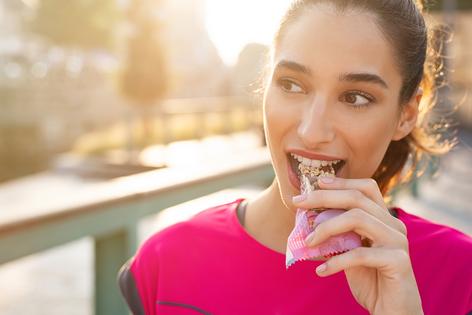7 ways to boost your energy through food
Published in Health & Fitness
If you feel run-down and exhausted, you may be tempted to turn to sugar and/or caffeine to bolster flagging energy reserves.
Bad idea, says Dina Aronson, RD: “Fatigue breaks us down physically and emotionally and wreaks havoc on the immune system, making us more susceptible to illness, depression and even chronic conditions like heart disease.” Moreover, proper nutrition and the timing of what you eat can do wonders to make you feel alert and powerful, says Cynthia Sass, RD, a nutritionist and weight-loss blogger. Here are the new rules for eating for energy.
1. Eat more iron from plants.
Nearly 30% of the global population is iron deficient, with women and children being impacted the most. Iron deficiency can cause fatigue and impair physical and mental endurance. Iron is needed to deliver oxygen to cells. Great plant sources of iron include beans, lentils, spinach and sesame seeds; eating them with vitamin C-rich foods can boost iron absorption.
2. Eat the right food combos.
Sass says the right formula for maximum energy is: fruit or veggie + a whole grain + lean protein + plant-based fat + herb/spice. She calls it the “5-piece puzzle” and it’s the premise of her book “S.A.S.S! Yourself Slim.”
“Balance is key; your body loves to be in balance,” says Sass.
3. Skip caffeine.
Despite the health benefits of tea and coffee, if you’re feeling run-down, cut it out: “Caffeine gives a ‘false’ energy essentially, because it’s a stimulant,” Sass says. “And after it peaks, you can start to feel tired or even more tired.”
4. Eat more real food.
Real food means food that’s closer to nature: whole grains rather than processed chips or crackers from a box, whole fruit rather than juice or fruit bars. That includes a wide variety of “super fruits” — apples, stone fruits, berries, tomatoes. Plus, if you eat produce locally and in season, it will have reached its peak and hold more nutrients, says Sass.
5. Choose the right energy bars.
When choosing an energy bar, ignore what’s on the front of the package and check the ingredients list, says Sass: “If the ingredients read like a recipe, and I feel like I could buy the ingredients and make it myself, that’s great. If it reads like a science experiment, with ingredients that aren’t real whole foods, I’ll pass.”
6. Don’t zap fat.
“You need fat to absorb some key antioxidants,” says Sass. In one study that compared salads served with fat-free, low-fat and full-fat dressing, people absorbed fewer antioxidants from the veggies when they ate fat-free dressing. The reason: Some antioxidants have to grab onto fat in order to be absorbed from the gastrointestinal tract into the blood, where they can go to work. Antioxidants are important for energy because they flight free radicals and keep your cells healthy, Sass adds.
7. Choose frozen foods.
While fresh and local is great, frozen foods are a potent source of energizing nutrients too. “Freezing actually locks in nutrients, so a frozen fruit with no added ingredients can be just as nutritious or even more than fresh, unless the fresh was just picked,” Sass says. “The minute a fruit or veggie is harvested, it starts to lose nutrients.”
(Health delivers relevant information in clear, jargon-free language that puts health into context in peoples’ lives. Online at www.health.com.)
©2023 Dotdash Meredith. All rights reserved. Used with permission. Distributed by Tribune Content Agency, LLC.










Comments